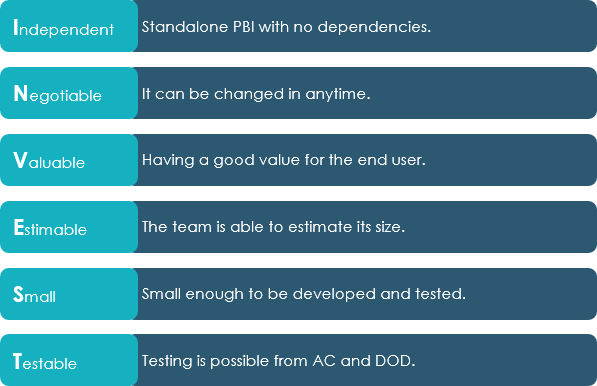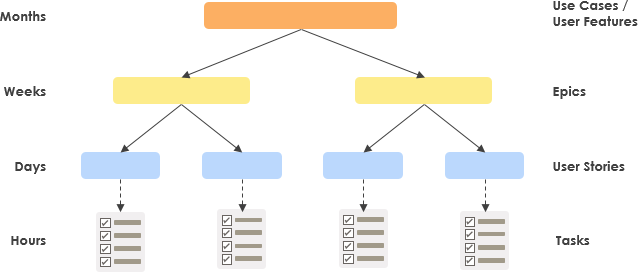I came across this article that includes two mnemonics that I really like.
The INVEST as a reminder of the characteristics of a good quality Product Backlog Item (PBI) (or user stories) commonly written in user story format. But what are characteristics of a good user story? The acronym “INVEST” can remind you that good stories should be:
A good user story should be — INVEST:
- Independent: Should be self-contained in a way that allows to be released without depending on one another.
- Negotiable: Only capture the essence of user’s need, leaving room for conversation. User story should not be written like contract.
- Valuable: Delivers value to end user.
- Estimable: User stories have to able to be estimated so it can be properly prioritized and fit into sprints.
- Small: A user story is a small chunk of work that allows it to be completed in about 3 to 4 days.
- Testable: A user story has to be confirmed via pre-written acceptance criteria.

Product Backlog Refinement: Stories and Tasks
Product Backlog refinement is the act of adding detail, estimates and order to items in the Product Backlog. Ongoing Product Backlog Refinement is needed within each Sprint to refine items to be ready for future Sprints. When the backlog items are refined to the suitable level of granularity, the Product Backlog items at the top of the Product Backlog (highest priority, greatest value) are decomposed so they fit within one Sprint as shown in the Figure below.

When a product backlog items are refined and to be included in the sprint backlog, they are typically in form of user stories readily to be used for in the Part 1 of Sprint Planning. These user stories are typically further refined into tasks in the Part 2 of Sprint planning for assigning to the development team members.
A good TASK should be — SMART:
SMART is a set of criteria for creating goals such as Sprint goals which is a short statement written by the Scrum team (based on the Product Owner’s initial objective) to lead them in the direction of what they want the tasks to be be accomplished according to the sprint goal.
SMART stands for Specific, Measurable, Achievable, Relevant and Time-bound. Having goals written in a SMART format ensures that the goal-setter is clear on what they’re trying to accomplish, when and how.
Specific: when setting a goal, be specific about what you want to accomplish. Think about this as the mission statement for your goal.
Measurable: what metrics are you going to use to determine if you meet the goal? This makes a goal more tangible because it provides a way to measure progress. If it’s a project that’s going to take a few months to complete, then set some milestones by considering specific tasks to accomplish.
Achievable: This focuses on how important a goal is to you and what you can do to make it attainable and may require developing new skills and changing attitudes. The goal is meant to inspire motivation, not discouragement. Think about how to accomplish the goal and if you have the tools/skills needed. If you don’t currently possess those tools/skills, consider what it would take to attain them.
Relevant: This refers focusing on something that makes sense with the broader business goals. For example, if the goal is to launch a new product, it should be something that’s in alignment with the overall business objectives. Your team may be able to launch a new consumer product, but if your company is a B2B that is not expanding into the consumer market, then the goal wouldn’t be relevant.
Time bound: anyone can set goals, but if it lacks realistic timing, chances are you’re not going to succeed. Providing a target date for deliverables is imperative. Ask specific questions about the goal deadline and what can be accomplished within that time period. If the goal will take three months to complete, it’s useful to define what should be achieved half-way through the process. Providing time constraints also creates a sense of urgency.

References
- Write SMART Goals & INVEST for User Stories
- Who Create Product Backlog Items or User Stories in Scrum?
- What is Story Point in Agile? How to Estimate a User Story?
- What is DEEP in Product Backlog?
This post is also available in Deutsch, Español, فارسی, Français, Bahasa Indonesia, 日本語, Polski, Portuguese, Ру́сский, Việt Nam, 简体中文 and 繁體中文.













